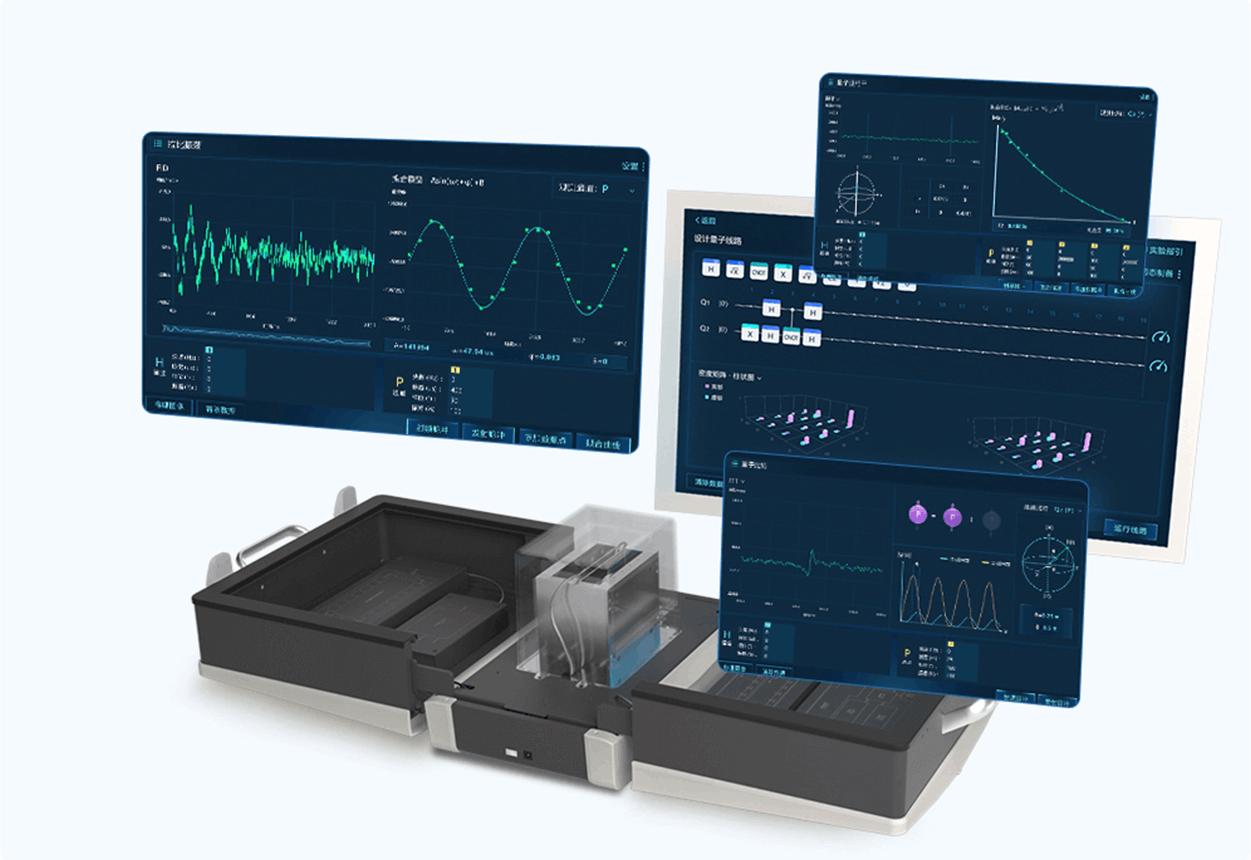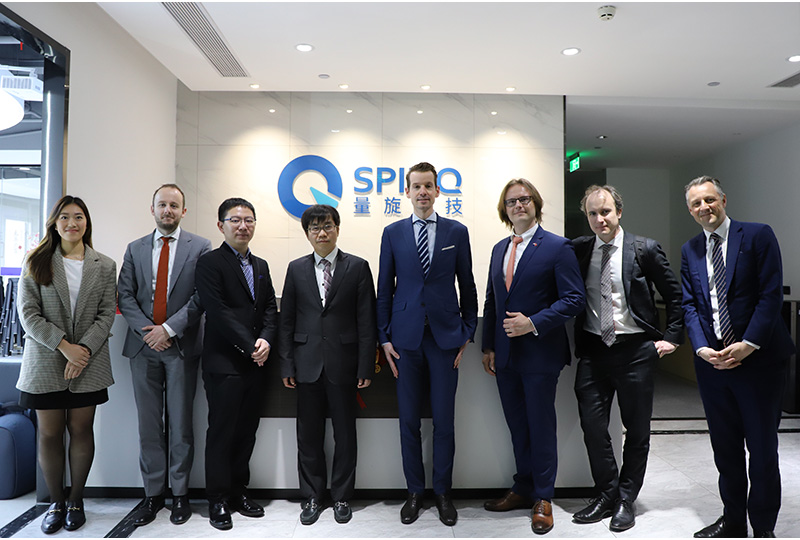Quantum Machines: Revolutionizing the Future of Computing Technology
2025.09.12 · Blog Quantum Machines
Quantum machines represent the most ambitious technological leap since the invention of the transistor, harnessing the fundamental laws of quantum mechanics to solve problems that would take classical computers millennia to complete. These revolutionary devices utilize quantum bits (qubits) that can exist in multiple states simultaneously through superposition and be interconnected via entanglement, creating computational paradigms that far exceed the capabilities of traditional binary systems.
The Quantum Machine Revolution

Quantum machines encompass more than just quantum computers—they represent a comprehensive ecosystem of quantum processors, control systems, and measurement devices that work together to manipulate quantum information. Unlike classical computers that process bits as either 0 or 1, quantum machines operate with qubits that can represent both states simultaneously, enabling exponential increases in computational power for specific applications.
The global quantum technology market is experiencing unprecedented growth, with quantum funding in the first five months of 2025 already reaching 70% of 2024's total investment. This surge reflects growing confidence that quantum machines are transitioning from research laboratories to practical commercial applications.
Core Technologies Powering Quantum Machines
Superconducting Quantum Systems
Superconducting quantum machines currently dominate the industrial quantum computing landscape. These systems utilize superconducting circuits operating at temperatures near absolute zero (~10-20 mK) to create highly stable qubits. Companies like IBM, Google, and SpinQ have pioneered superconducting quantum processors that achieve gate fidelities exceeding 99.9% and coherence times up to 100 microseconds.
SpinQ's superconducting quantum systems exemplify the state-of-the-art in quantum machine technology. The company's SPINQ SQC Superconducting Quantum Computer leverages circuits with Josephson junctions, where qubits are formed by macroscopic quantum effects. This approach enables scalable qubit numbers, high gate fidelity, and controllable multi-qubit coupling, making it one of the most rapidly advancing quantum computing platforms.
Nuclear Magnetic Resonance (NMR) Quantum Machines
NMR quantum machines offer unique advantages for education and research applications. SpinQ has pioneered this technology with systems like the SPINQ Gemini Mini Pro and SPINQ Triangulum, which operate at room temperature and require no maintenance. These quantum machines use nuclear spins as qubits, manipulated through precisely controlled RF pulses to perform quantum computations.
The accessibility of NMR quantum machines has democratized quantum computing education. Unlike superconducting systems that require complex cryogenic infrastructure, NMR quantum machines can operate in standard laboratory environments, making quantum technology accessible to universities and high schools worldwide.
Quantum Control Systems: The Neural Network of Quantum Machines
The effectiveness of any quantum machine depends critically on its quantum control systems—the classical electronics that generate precise signals to operate quantum hardware. These systems represent the bridge between classical and quantum worlds, enabling the manipulation of delicate quantum states with extraordinary precision.
SpinQ's SPINQ QCM System exemplifies advanced quantum control technology. This comprehensive platform integrates arbitrary waveform generators, quantum analyzers, clock distribution units, and power management systems into a modular, FPGA-accelerated architecture. With 16-bit vertical resolution and sub-nanosecond synchronization accuracy, the QCM system enables precise control of hundreds of qubits.
Industry Leaders Shaping Quantum Machine Technology
IBM: Pioneering Quantum Hardware and Software Integration
IBM remains a quantum machine industry leader, developing both cutting-edge hardware and comprehensive software ecosystems. The company's quantum roadmap extends to 2033, targeting systems capable of running 1 billion gates on up to 2,000 qubits. IBM's Quantum System Two represents the company's modular approach to quantum architecture, providing the foundation for future large-scale quantum machines.
Google: Achieving Quantum Supremacy and Error Correction
Google's Willow quantum chip demonstrated a breakthrough in quantum error correction, achieving exponential error reduction as more qubits are added to the system. This 105-qubit superconducting processor solved complex calculations in under five minutes that would take classical supercomputers 10^25 years—providing strong evidence that practical quantum machines are achievable.
SpinQ: Democratizing Quantum Technology Access

SpinQ has distinguished itself by making quantum machines accessible across educational and industrial applications. The company offers comprehensive quantum solutions spanning from portable educational devices to industrial-grade superconducting quantum computers. SpinQ's achievement as the first Chinese company to export superconducting quantum chips overseas demonstrates its global technological competitiveness.
Quantum Machine Applications Transforming Industries
Financial Services: Quantum-Enhanced Decision Making
Quantum machines are revolutionizing financial technology through applications in portfolio optimization, risk management, and fraud detection. SpinQ's collaboration with Huaxia Bank exemplifies this transformation, where quantum neural networks were deployed to optimize ATM decommissioning decisions. The quantum AI model achieved superior computation speed and accuracy compared to classical approaches, earning recognition from the People's Bank of China.
Pharmaceutical Research: Accelerating Drug Discovery
The pharmaceutical industry is leveraging quantum machines for molecular modeling and drug discovery. BGI Research partnered with SpinQ to address genome assembly challenges using variational quantum algorithms. By employing quantum-classical hybrid algorithms, the project demonstrated how quantum machines can effectively enhance computational capacity for analyzing large-scale genomic datasets.
Artificial Intelligence and Machine Learning
Quantum machines are creating new paradigms in AI and machine learning through quantum-enhanced algorithms. Recent research by SpinQ and partner institutions developed machine learning models that can predict quantum system dynamics and infer hidden parameters with sub-1% error rates. This breakthrough demonstrates how quantum machines can improve their own calibration and control systems.
Quantum Machine Architecture and Components
Quantum Processing Units (QPUs)
The Quantum Processing Unit serves as the computational heart of quantum machines. SpinQ's QPU series features 1D or 2D chain topologies operating in 20mK environments, with high Qi values and long qubit lifetimes enabling extended quantum operations. The company's proprietary QPU fabrication center ensures independent quality control and minimizes cross-contamination risks.
Cryogenic Systems: Enabling Quantum Operation
Most quantum machines require ultra-cold operating environments to maintain quantum coherence. Dilution refrigerators achieve temperatures of 10-20 millikelvin, creating the conditions necessary for superconducting qubits to function. SpinQ provides comprehensive cryogenic solutions, including equipment selection, installation, and maintenance services.
Quantum Error Correction: Ensuring Reliable Operation
Quantum error correction represents one of the most critical challenges in quantum machine development. Google's Willow chip demonstrated that adding more physical qubits can actually reduce overall error rates—a milestone achievement in quantum error correction. This breakthrough suggests that large-scale, fault-tolerant quantum machines are becoming feasible.
The Global Quantum Machine Landscape
Market Growth and Investment Trends
The quantum machine market is experiencing explosive growth, with commercial quantum computer orders totaling $854 million in 2024—a 70% increase from 2023. This growth reflects expanding adoption across sectors and geographies, with vendors selling more units at lower average prices. The trend toward multi-year contracts and full-stack system sales indicates the industry's transition from experimental deployments to commercial-scale commitments.
Workforce Development and Education
The quantum machine revolution is driving unprecedented demand for skilled professionals. Analysts estimate that 250,000 quantum computing jobs will be needed by 2030. SpinQ addresses this challenge through comprehensive educational solutions, from portable quantum computers for high school students to advanced research platforms for universities.
International Competition and Collaboration
Quantum machine development has become a strategic priority for nations worldwide. China's quantum technology initiatives include substantial government investments and national research centers. The United States, European Union, and other regions have similarly prioritized quantum technology development, creating a global race for quantum supremacy.
Future Directions in Quantum Machine Technology
Scaling Toward Fault-Tolerant Systems
The next phase of quantum machine development focuses on achieving fault-tolerant quantum computing. IBM's roadmap targets systems with 200 logical qubits by 2029, while Microsoft's Majorana architecture aims to scale to one million qubits on a single chip. These developments will enable quantum machines to tackle problems currently beyond reach.
Quantum-Classical Integration
Future quantum machines will increasingly integrate with classical computing systems, creating hybrid quantum-classical architectures. This integration enables leveraging quantum advantages for specific computations while maintaining classical systems for tasks better suited to conventional processing.
Quantum Networking and Communication
Quantum communication networks represent an emerging frontier that could revolutionize cybersecurity. Quantum machines will play crucial roles in quantum key distribution networks and post-quantum cryptography systems, ensuring secure communications in the quantum era.
Quantum Machines and Emerging Technologies
Artificial Intelligence Synergies
The convergence of quantum machines and AI creates powerful synergies. Quantum computing can accelerate AI model training and optimization, while AI can improve quantum hardware calibration and error correction. SpinQ's research demonstrates how machine learning models can predict quantum system behavior with remarkable accuracy.
Sustainability and Climate Applications
Quantum machines offer unique capabilities for addressing climate challenges through improved material modeling and optimization algorithms. These systems can accelerate discovery of new materials for renewable energy applications and optimize complex systems for reduced environmental impact.
Robotics and Automation
Robotics integration with quantum technology creates opportunities for enhanced precision and optimization. Quantum sensors can provide unprecedented measurement accuracy, while quantum computing can optimize robotic control systems and planning algorithms.
Industry Standards and Ecosystem Development
Standardization Efforts
The quantum machine industry is working toward establishing standards for hardware interfaces, software protocols, and cloud services. These standardization efforts will reduce fragmentation and enable greater interoperability between different quantum systems.
Cloud-Based Quantum Access
Quantum-as-a-Service (QaaS) platforms are democratizing access to quantum machines. SpinQ's cloud platform connects users to real quantum computers with 2, 3, 5, and 8 qubits, alongside high-performance simulators supporting up to 24 qubits. This approach enables broader experimentation without the need for on-premises quantum hardware.
Conclusion: The Quantum Machine Future
Quantum machines represent far more than an incremental improvement in computing—they embody a fundamental shift in how we approach complex computational problems. From SpinQ's pioneering educational quantum computers that make quantum technology accessible in classrooms worldwide, to IBM's and Google's superconducting quantum processors pushing the boundaries of computational capability, quantum machines are transitioning from laboratory curiosities to practical tools.
The convergence of hardware advances, software sophistication, and growing market demand is accelerating quantum machine adoption across industries. Financial institutions are deploying quantum neural networks for intelligent decision-making, pharmaceutical companies are leveraging quantum algorithms for drug discovery, and educational institutions are preparing the next generation of quantum-literate professionals.
As we advance toward fault-tolerant quantum systems capable of running millions of operations with unprecedented reliability, quantum machines will unlock new possibilities in artificial intelligence, materials science, cryptography, and optimization. The companies and researchers driving this revolution—from established technology giants to innovative startups like SpinQ—are not just building faster computers; they are creating the computational foundation for humanity's next technological era.
The quantum machine revolution is not a distant future possibility—it is happening now, with real systems solving real problems and creating measurable value across diverse applications. As quantum technology continues to mature and scale, these remarkable machines will fundamentally transform how we understand and interact with the computational universe around us.
The future belongs to quantum machines, and that future is accelerating toward us at quantum speed.
Featured Content






